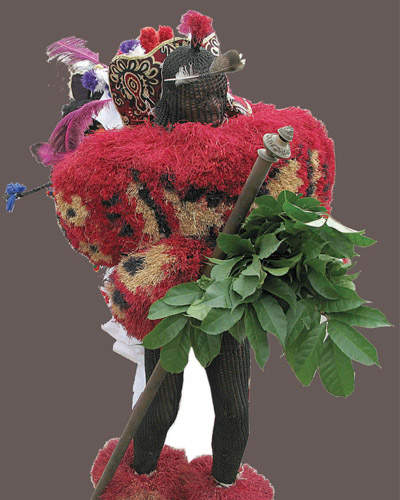 Thrown into the vortex of the trans-Atlantic slave system, Africans in the Western Hemisphere were in many cases able to regroup to form communities in which their specific philosophies and lifeways could be taught to their offspring. This information was so valuable in the process of adaptation and defense in the new environment that it has been passed on for many generations…
Thrown into the vortex of the trans-Atlantic slave system, Africans in the Western Hemisphere were in many cases able to regroup to form communities in which their specific philosophies and lifeways could be taught to their offspring. This information was so valuable in the process of adaptation and defense in the new environment that it has been passed on for many generations…
In the Cross River basin of Nigeria and Cameroon of the eighteenth and nineteenth centuries, social life was organized through separate initiate societies for men and women. In the absence of a state system, regional trade networks were sustained through membership in a titled society, with each autonomous community having its own lodge.
The leopard society of the Cross River basin is known variously as Ekpe, Ngbe and Obe, after the local terms for leopard. Being among the most diverse linguistic regions in the world, to simplify, I will hereafter use Ekpe, the Efik term most common in the literature.
Hundreds of Cross River settlements each possessed their own Ekpe lodge, a symbol of their autonomy, where matters concerning local governance were settled in councils until colonial rule at the end of the nineteenth century. In Old Calabar in 1847, the Reverend Hope Waddell wrote, “The towns of Calabar are, in fact, a number of small republics, each with its own chief and council, united only by the Egbo [Ekpe] confraternity, so far as they have joined it for mutual defense. Few details are known about early Ekpe history, but indications are that after continuous contact with European merchants was established in the early 1600s, Ekpe was transformed by the Efik-speaking traders whose beachland settlements on the Calabar River received European cargo ships.
“Based upon a mercantile and educational relationship with British port cities, Efik Ekpe in Calabar developed an eclectic tradition reflecting the reach of their trade networks. As the European demand for slaves grew (from the 1630s to the 1840s), Efik traders extended these networks throughout the entire Cross River basin, eastward into present-day Cameroon and northward to the Aru (Arochukwu) trading oligarchy, encompassing all the Cross River settlements mentioned in this study, where languages such as Balondo (Efut), Ejagham, and Ibibio, Igbo, Oron, and Umon were (and still are) spoken.
Many settlements in the reach of the expanding Efik trading zone, like Abakpa (Qua Ejagham), Oban, and Uruan, may have already possessed forms of Ekpe (as many of their contemporary leaders claim).
“Nevertheless, Efik merchants shared their own forms of Ekpe with many settlements with the aim of solidifying trade relationships.
The result, according to one Cross River historian, was an Ekpe Imperium. Being the dominant form of interethnic communication, the ceremonial practices of Ekpe reflect a rich variety of languages, costumes, music, and dance from the entire region.
As the European demand for slaves increased, competition among dominant Efik settlements for access to the cargo ships intensified, resulting in several battles where some Ekpe members were enslaved and carried to the Caribbean. Peoples from the hinterlands who may not have been Ekpe members, but who stayed in Ekpe regions while passing down the Cross River from Cameroon or while passing through Arochukwu en route to Bonny or Calabar, would have learned about Ekpe’s importance as a political system, enabling them to have contributed to its recreation if they reached Cuba”.



